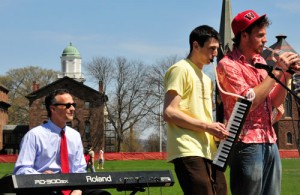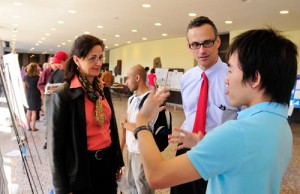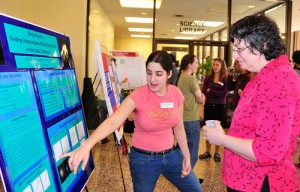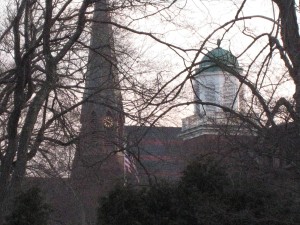As our semester winds to a close, and as students prepare experiments, performances, papers and presentations, I often see my faculty colleagues literally running across campus. They are racing to lectures and seminars, committee meetings on the curriculum or the budget, or advisory meetings with students. This last activity is often the most rewarding part of what they do as faculty at Wesleyan.
On Tuesday I taught my penultimate class for The Past On Film. We talked about a British film, Distant Voices, Still Lives, and I suggested to my rather skeptical group of undergraduates that this film offers a serious perspective on the painful construction of desire inside the modern family. After class, I ran to the faculty meeting where there were at least 100 professors eager to take part in a serious discussion of a possible summer session at Wesleyan for 2010. I marveled at their energy. The chemists, fresh from their labs, were focused on the educational and financial issues, as were the historians who had just finished their seminars. The artists and the social scientists, after working with students throughout the day, were eager to lend a hand in crafting an approach to a new program that would have educational integrity and be economically sustainable.
Recently I blogged about a poster session in which undergraduate science majors presented research that was sophisticated and professional. Last night I attended part of an event at the College of Letters where students presented brief summaries of their theses to their teachers and to sophomores and juniors. I’ll mention just a few examples to give a sense of the diversity of subjects. Chris Patalano wrote a novella and Benjamin Sachs-Hamilton translated and directed a play – both projects were grounded in premodern texts. Sofia Warner examined changing modes of psychiatric worldviews from the patient’s perspective. Russell Perkins, whom I had gotten to know because of his important work on bringing classes into prisons, had his thesis on art and philosophy described to the audience by another senior, Jason Kavett (recent winner of Fulbright and DAAD scholarships). Russell returned the favor by providing an account of Jason’s thesis on romanticism.
As I walked home with Sophie, I marveled at how wonderful these projects were. And then I thought that each and every one of them – like all thesis projects at Wesleyan — – had been supervised individually by a faculty member. In conversation and in their presentations, students show that their theses are often labors of love as well as of worldly investigation and self-discovery. In each case they are guided by a faculty member who takes the time and care to help them along the way. Truly, these are labors of love!
There is a long tradition of this kind of faculty devotion at Wesleyan. While individual professional rewards are often given for other kinds of “production,” our entire community is the beneficiary of this ongoing, thoughtful generosity. As we come to the end of the spring term, it is such a joyous experience to see our graduating students exemplify the creative intellectual virtues that their teachers also embody.
I still remember my feelings of anxiety and pride as I finished my own thesis here. As a student, I was profoundly grateful for the mentoring (and editing!) I received. As a teacher, I know how gratifying it is see these strong examples of mature, independent work. BRAVO!
[tags] The Past on Film, summer session, College of Letters, theses, Chris Patalano, Benjamin Sachs-Hamilton, Sofia Warner, Russell Perkins, Jason Kavett [/tags]









